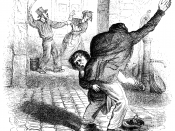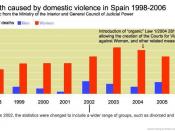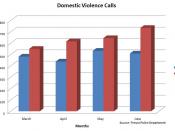Domestic Violence and the Ripple Effect
Domestic violence is any assault, aggravated assault, battery, aggravated battery, sexual battery, stalking, aggravated stalking, kidnapping, false imprisonment, or any criminal offense resulting in personal injury or death of one family or household member by another, who is or was residing in the same single dwelling unit. Domestic violence spreads through society as an epidemic in families, workplaces, churches, schools and communities becoming a ripple effect as a pebble thrown into calm and still waters. It effects all people of no certain soci-economic group, race or educational background.
Domestic violence is a dis-ease that touches people from all communities. Research indicates that family violence effects emotional, economical and physical stability. The emotional effects of the female involve verbal abuse, isolation, intimidation, coercion and threats that are only compounded when physical abuse is added to the component. The abuser experiences emotional effects as well. The abuser and the victim usually have experienced some form of abuse in their life, whether growing up inside an abusive family or experience from past relationships.
The children are effected according to researchers as early as prenatal development. Children who are raised in family violence experience what is called "high terror" alert. Children's brains are usually 90% developed by the age of three, according to Dr. Bruce Perry, M.D., Ph.D.
All experiences, good and bad, change the brain. Good experiences like music lessons, hugs and kisses, and strong family support cause the brain to form or "to wire" itself a certain way. Bad experiences like natural disasters; chronic illness, poverty, neglect and abuse cause the brain to grow a different way. "Children who are raised in impoverished conditions...are at high risk for having impoverished brains."
When children experience family violence they become secondary victim in that relationship and...



Violence
strange subject very hard to write on.
1 out of 1 people found this comment useful.